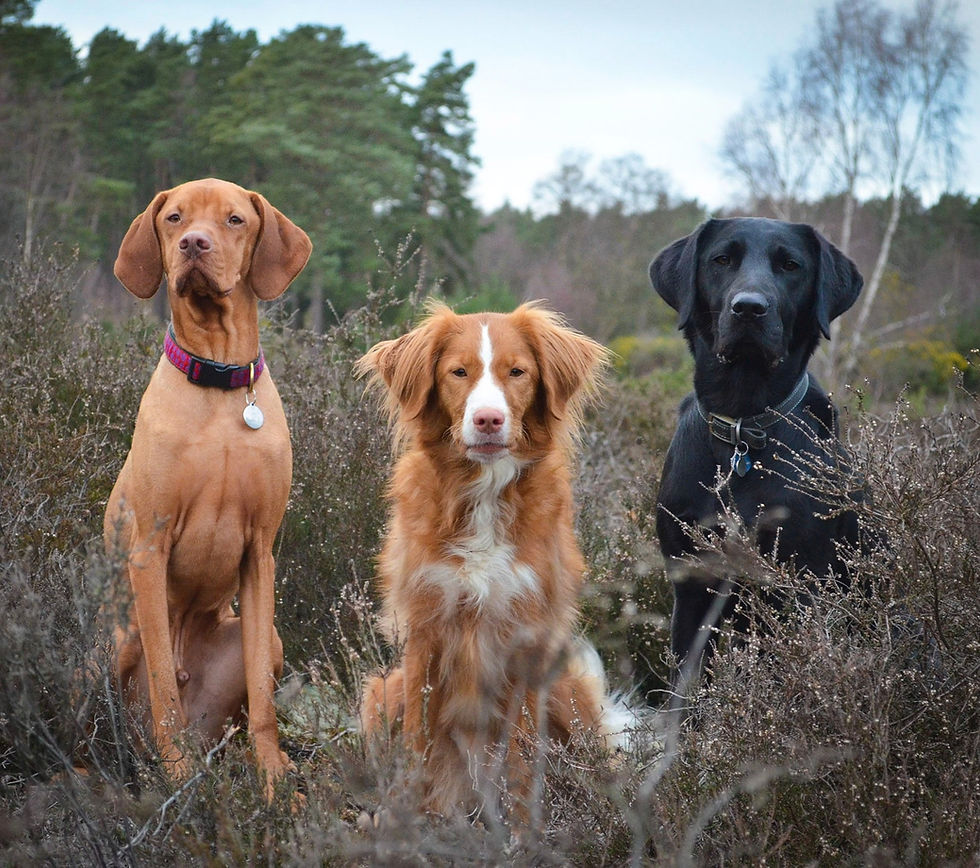Is your dog ready for Christmas?
- Naomi White

- Nov 25, 2024
- 4 min read
It’s never too early to get excited about Christmas, is it? Whether you’re eagerly counting down the days or feeling the Christmas stress, have you thought about your dog in your plans?
Christmas can be a stressful and overwhelming time for everyone, including our dogs. High emotions and disrupted routines can lead to unexpected or problematic behaviours in dogs. Being prepared and planning ahead is the best way to avoid any difficult moments with your dog.
Consistent routines for your dog
During Christmas, routines often change. People are at home more, visitors come and go, and schedules become unpredictable. Dogs become accustomed to regular routines of walks, sleep, and social interaction, and this is often completely different over the holidays which can create stress and anxiety for some dogs who struggle with the changes.
To help, try to maintain some consistency:
Keep mealtimes predictable, even if you vary how you feed them (e.g. enrichment games or training), stick to set mealtimes to provide some predictability in their day.
Keep their daily activities consistent. Whether it’s a run in the woods, a sniffy walk in the park, or playtime at home, don’t let the busyness get in the way of your dogs favourite activities. Do shorter walks if needed but ensure they still receive dedicated time with you each day.
Encourage regular rest time and provide space from busy situations. Create quiet, restful spaces for them to relax away from the chaos.
Christmas social events
Some dogs love social events and keenly dive into the action. However, even outgoing dogs can become overstimulated and tired. Others may find noisy, chaotic environments overwhelming, especially if they’re already wary of unfamiliar people or children.
While sociable dogs may look like they’re loving life, there’s a fine line before they could become overstimulated, anxious, and tired. Especially in a busy social situation, they may not know how or when to remove themselves and relax.

Whether your dog is a social butterfly or more of an introvert, ensure they have a safe place to retreat to, where they can relax undisturbed. Encourage rest, even for the most social dogs so they don't become over-tired. Providing a chew or calming activity can help them settle away from the action.
When visiting someone else’s house with your dog, stress levels can rise even more due to the novelty and unfamiliarity of the situation. Bring their crate if they’re crate-trained or ask to use a quiet room - this gives them a familiar and secure place to retreat to if needed.
High stress for dogs
Emotions can run high at Christmas, we all feel levels of excitement and stress, we might also feel tired and drained at times. Our dogs are likely to feel the same, and they may pick up on our emotions too.
During various events, they may be exposed to situations which make them feel more stressed, anxious, excited, or frustrated and this can create potentially difficult behaviours. It can be a time where new behaviours suddenly appear, or existing behaviours escalate. And if we’re too busy to watch the dog, we might miss important signals before it’s too late.
Watch for these potential stressors:
Constant interaction from people can overwhelm dogs and they may struggle to rest undisturbed or feel trapped and uncomfortable. Without intervention, they might growl, snap, or bite to express their discomfort.
Children may unintentionally handle dogs roughly or take things from them, causing pain or fear. If a dog’s subtle signals (e.g., moving away, lip licking, or yawning) are missed, they may escalate to growling or biting.
Noise and novelty during busy Christmas gatherings may be scary for some dogs, and the disruption to their familiar home environment can add stress and anxiety. This increased stress may lead to behaviours such as, restlessness, barking, jumping up, destructiveness, or aggression.
Unfortunately, we can often miss our dog's subtle warning signs of stress and anxiety, such as trying to move away, pulling their ears back, licking their lips, yawning, turning their head away, or showing wide eyes. If we miss these repeatedly, they will feel the need to display clearer signals to communicate their feelings, and this is where they may growl or bite.

This is unlikely to be your dog’s fault, they are simply communicating with us. We are often at fault for missing signals or not intervening when they are feeling uncomfortable and overwhelmed. Even the most friendly, placid dog can be pushed to the limit in stressful situations.
Just like humans, you may typically be laidback and slow to react, but after three stressful days of Christmas prepping and planning, a small thing might cause you to snap in frustration. Dogs are no different. Some dogs have higher tolerance, while others are pushed over the edge much quicker.
Key reminders to help your dog feel safe and relaxed at Christmas:
Observe their signals. Move them to a quieter space if they show signs of stress, such as wide eyes, lip licking, or yawning.
Ensure they aren’t overwhelmed. Provide a calm area away from busy activities or children playing.
Prevent issues by managing their environment. Keep them away from situations where conflict might arise, like stealing food or being approached while eating or sleeping.
Stop children or adults from taking things from your dog. This reduces the chance of negative reactions.
If they're restless and pacing around, this could be a sign of overtiredness and overstimulation, so pop them into a quiet room to sleep.
Christmas brings plenty to think about, but don’t forget your dog’s needs. Giving them space to rest not only benefits them but also brings peace of mind to you. If you’re unsure how to support your dog this Christmas season, reach out to The Hound Spot for advice!




Comments